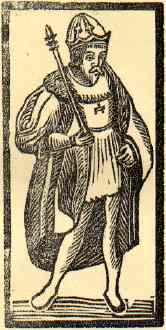A shift in power: the decline of the nobility
Readers of Shakespeare's plays about Henry VI and Richard II will have noticed the enormous power wielded by rebellious members of the nobility.
But the power of the King increased as the peasants protested, methods of warfare changed*, the middle class became more important, and government administration became increasingly centralized.
During the middle ages, nobles and their retinues made up a military elite, upon whom kings were dependent for support in war, for the suppression of revolts like those of Wat Tyler and Jack Cade. But the introduction of gunpowder ruined the nobility's comfortable monopoly of might.
Divine right
The doctrine of the "divine right" of the king was a convenient way of preaching the sustaining of the existing order in society. It persisted as long as it did partly because monarchs were too wise to insist on the implied absolutism of their power--until James I, who began the process of alienation of the populace that led to the Puritan revolution and the temporary abolition of the monarchy.
On divine right in Shakespeare*.
Footnotes
-
New technology, new order
Beginning in the 16th century, the cost of war, with a trained infantry, muskets, and siege cannons, became prohibitive for all but the ruler. And fortresses, which once protected uppity nobles from royal control, were no defense against royal siege cannons (able to hurl 800-pound missiles).
The decreasing independence of the nobility contributed to the centralizing of power that was characteristic of the early modern state.
-
Shakespeare on divine right
The doctrine taught that the divinely ordered hierarchy put the King at the head of the nation, God's anointed deputy on earth. Thus in Richard II, the Bishop of Carlisle speaks passionately against Henry's proposed usurpation:
. . . shall the figure [image] of God's majesty,
His captain, steward, deputy elect,
Anointed, crownèd, planted many years,
Be judged by subject and inferior breath,
And he himself not present?
Carlisle goes on to prophesy the carnage of the Wars of the Roses:
The blood of English shall manure the ground,
And future ages groan for this foul act. . .
Disorder, horror, fear, and mutiny
Shall here inhabit."
(4.1.125-43)
And Claudius, threatened by Laertes, tells Gertrude that she need not fear: "There's such divinity doth hedge a king/That treason can but peep to what it would." (Hamlet, 4.5.124-25)
